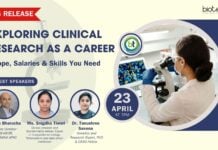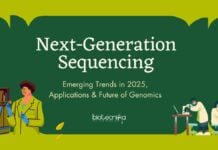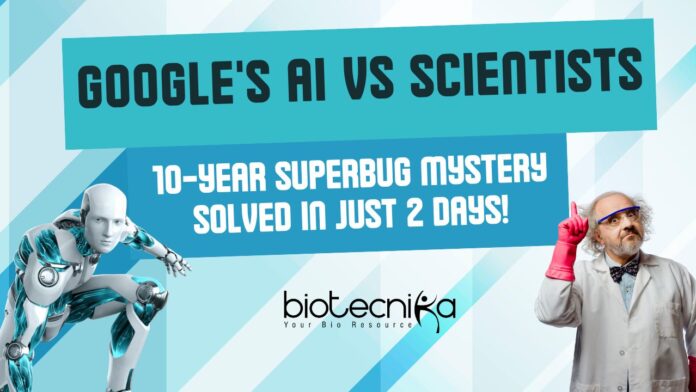Google AI Solves Superbug Mystery: 10-Year Problem Cracked in 2 Days
Have you thought about how a superbug becomes infectious?
A group of researchers from Imperial College London were working on unlocking this mystery. They have spent tireless hours, or you can say a decade, to understand the mechanisms behind this infectious tiny creature. The one that allows them to spread across diverse populations and resist antibiotics. We know that antimicrobial resistance (AMR) has become a global crisis.
Artificial intelligence has become a game changer. In just 48 hours, Google’s AI “Co-scientist” has solved the mystery around superbugs. The one that captured the attention of the scientific community. This finding raises a lot of questions.
Could AI be the key to solving long-standing scientific puzzles that were unsolved for years, or is this a sneak peek into the future of research? Is there a future where scientists are suppressed and can be replaced by machines?
Before we start studying this breakthrough, let’s understand why it matters. AMR is commonly called a silent pandemic. The factor that reduces the effectiveness of antibiotics and other crucial treatment medications. AMR is now across the globe.
A 2019 CDC has published a report. The one which states that 1.27 million people died from drug-resistant bacteria, including 35,000 in the U.S. The figures are alarming, aren’t they? In just six years, this number has risen by 52%.
Antibiotic-dependent procedures like transplants and surgeries have serious risks. Researchers are seeking solutions. José Penadés’ and his team hold the answers to these questions.
They are focused on capsid-forming phage-inducible chromosomal islands (cf-PICIs). This is a group of bacteria-infecting viruses. Their research explains how viruses form a link with bacterial species. This was a key factor in antibiotic spread resistance.
What is the hypothesis? The viruses might have “borrow” tails from other bacterial viruses. These help them form links with other species. After performing the tests, they confirmed their theory was correct. Before publishing their research, they tested Google’s AI “co-scientist.”
They provided a simple prompt. What followed next left them in shock. The AI analyzed the data, asked questions, and suggested the same conclusion in just two days.
Surprised by the rapid speed of Google’s AI breakthrough, the researchers thought if something suspicious was happening. Did Google access data that was unpublished? Penadés emailed the team and got a firm response denial.
This breakthrough raises two questions:
- Can AI catalyze the acceleration of medical research?
- Should scientists regard AI as a threat to their expertise?
AI analyzes data and creates accurate hypotheses quickly, speeding up drug discovery, disease modeling, and clinical trial efficiency. Researchers can solve problems quickly, advancing medicine and genetics.
AI minimizes research bias by evaluating all evidence free from human error and biases. This leads to better experimental designs and fewer wasted resources ideas.
Fundamentally, AI won’t substitute scientists. Instead, it will enable them to work more efficiently and faster.
Despite its promise, AI in research is controversial.
Some AI studies are irreproducible, meaning other scientists couldn’t validate the results. This brings up questions about whether AI models genuinely grasp scientific issues or merely match patterns from existing data.
The ethical dilemma looms: To what extent can we rest our confidence on AI-generated theories? If Ai begins to craft its own experiment and data, how can we be certain of the conclusions it derives, how do we believe it is unbiased?
In response, Experts are currently designing AI accountability tools aimed at identifying and mitigating fraudulent or misleading AI-generated research in order to prevent the perils of misuse.
“AI can propose groundbreaking hypotheses, but experiments must still be done by humans to confirm the findings.” — José Penadés, Lead Researcher
Google’s AI “co-scientist” serves as a wake-up call. AI accelerates scientific inquiry but simultaneously highlights integration challenges in research responsibly.
Currently, AI remains an appendage rather than a substitute for human scientists. It cannot conduct experiments, analyze biological processes, or innovate beyond its training. As AI evolves, its research impact will grow.
The scientific community must create a balance between AI potential and human oversight in discovery. One thing we can all agree on: this is just the exciting beginning!
In just a span of two days, Google’s AI achieved what took humans a decade to discover. AI can address climate change, cancer, neurological disorders, and future pandemics. As they say, with great power comes great responsibility. But the question is—are we prepared for it?



























